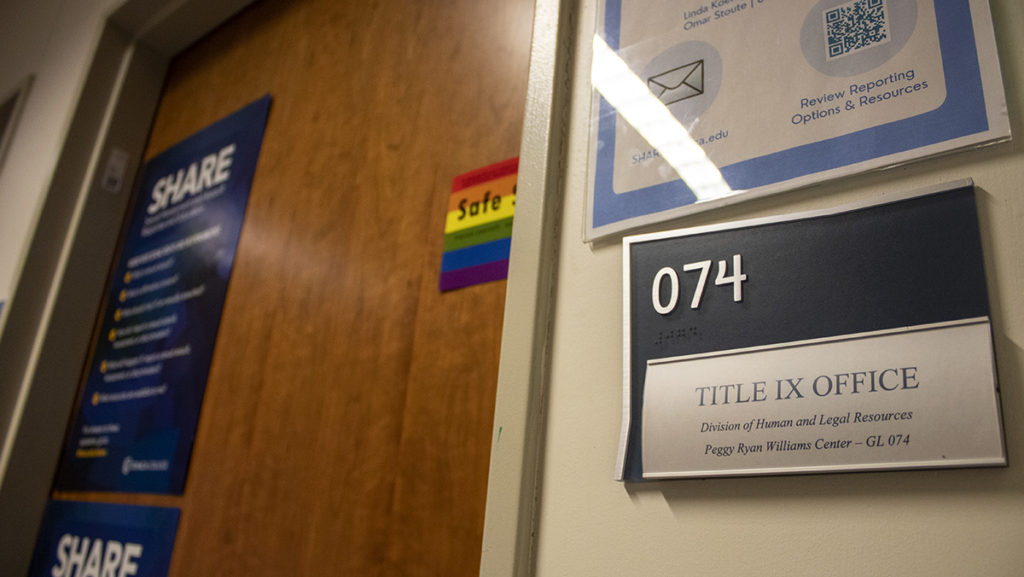An Ithaca College student filed a civil lawsuit against the college and a former associate dean of the Roy H. Park School of Communications in November 2023. The student, known as John Doe in the case, alleged that he was sexually abused and harassed by four then-employees of the college, including the former associate dean.
The Defendants in the lawsuit, Ithaca College and Bryan Roberts, both filed motions on Jan. 22 seeking to dismiss all or a majority of the claims in the original complaint.
Both the college and Roberts have filed motions to dismiss the Title IX claims.
Roberts’ memorandum states that John Doe clarified he is not alleging this cause of action against Roberts.
“Plaintiff has also claimed a violation of Title IX of the Education Amendments of 1972, but Plaintiff’s counsel has clarified that the claim is not asserted as against Mr. Roberts. For the reasons set forth below, none of the claims asserted against Mr. Roberts state a claim upon which relief can be granted and Mr. Roberts hereby moves under Rule 12(b)(6) of the Federal Rules of Civil Procedure for dismissal of all claims asserted against him,” Roberts’ motion states.
In its motion, the college is not seeking to have the Title IX claim dismissed at this time.
“The College is not at this juncture moving against plaintiff’s claims brought under Title IX of the Education Amendments of 1972, 20 U.S.C. § 1681 et seq., asserted as his second purported claim for relief. However, the referenced proof deficits, among other reasons, will doom those claims to dismissal at a subsequent stage of this case,” the college’s motion states.
For the four remaining claims, Roberts and the college each argue that Doe failed to state claims upon which relief can be granted, including that he did not allege sufficient facts in his complaint to support his causes of action. As a result, Roberts and the college have requested that the court dismiss these claims.
According to court rules, Doe has until Feb. 12 to respond to the motions and then Roberts and the college may file any replies by Feb. 20.
Update, Jan. 25:
Ithaca College
According to the college’s Memorandum of Law, the college filed a motion to dismiss Doe’s first, third, fourth and fifth claims for relief. This means they filed to dismiss Doe’s claims against the college for negligence; negligent hiring, retention, training, direction and supervision; negligent infliction of emotional distress; and intentional infliction of emotional distress.
In the Memorandum of Law, the college argued as follows:
1. “The Plausibility Standard Plaintiff Must Meet”
The first point of argument is based on the fact that a ““complaint that offers ‘labels and conclusion’ or ‘naked assertions’ without ‘further factual enhancement’ will not survive a motion to dismiss.””
2. “None of the Plaintiff’s Negligence Claims Survive Rule 12 Scrutiny”
The second point of argument points out that until New York rejected the doctrine of in loco parentis — meaning in place of a parent — colleges were expected to impose “a standard of care that was equivalent to the care owed by a parent to a child.” Following Eiseman v. State of New York in 1987, this is not the case anymore and the arguments state that colleges are no longer subject to providing that level of care to their students.
The argument further states that for a college to be held accountable for Title IX violations, they must be “deliberately indifferent” to incidents of sexual harassment it knew about and that such incidents must be “so severe, pervasive and objectively offensive that it can be said to deprive the victims of access to the educational opportunities or benefits provided by the school.” In the document, the college argues that this was false in Doe’s case.
Rule 12 scrutiny refers to Rule 12(b)(6), “permitting a motion to dismiss for failure of the complaint to state a claim on which relief can be granted.”
3. “Plantiff’s Negligent Hiring and Retention Claim Fails because He Has Not Sufficiently Alleged the College Had Any Notice of an Employee’s Propensity to Commit Sexual Abuse”
The third point argues that in order for the plaintiff to allege negligent hiring and retention, the employer must have prior awareness of “‘the employee’s propensity for the conduct which caused the injury’ prior to the injury’s occurrence.’”
“Moreover, it is well established that detailed factual assertions, rather than conclusory allegations, are required to withstand a motion to dismiss,” the motion states.
4. “Plaintiff’s Negligence Claims Premised on Vicarious Liability Fail”
Respondeat superior was a legal doctrine according to which an employer was responsible for the acts of its employees. However, the argument states that “as a matter of law, sexual abuse is an intentional act, undertaken outside the scope of employment, for wholly personal reasons,” and hence the college cannot be held liable.
5. “Plaintiff’s Negligent Infliction of Emotional Distress Claim is Meritless”
Point five of the argument dismisses Doe’s claim of Negligent Infliction of Emotional Distress (NIED). For an NIED claim, existence of a special duty — in this case, duty of the college to Doe — is a prerequisite. However, the argument points out that for a duty to be special to Doe, it ““must be specific to the plaintiff, and not some amorphous, free-floating duty to society.””
The argument also states that the NIED claim is duplicative of Doe’s negligence claim.
6. “Plaintiff’s Intentional Infliction of Emotional Distress is Equally Meritless”
The sixth point of the argument states that a claim for Intentional Infliction of Emotional Distress (IIED) can be made in New York state if conduct is extreme and outrageous, intends to cause severe emotional distress, there is a causal connection between conduct and unjust, and it causes severe emotional distress. The argument cites three reasons as to why Doe’s IIED claim is meritless: it “falls well short of the ‘extreme and outrageous,’ standard …” Doe does not present any facts to support that the college intended to cause him distress and it is duplicative of the IIED claim.
Roberts’ Motion to Dismiss:
Both the college and Roberts have filed motions to dismiss the Title IX claims. Roberts’ memorandum states that Doe clarified he is not alleging this cause of action against Roberts. This is also noted in point five of Roberts’ motion, “V. Despite indications to the Contrary in the Complaint, Plaintiff Does Not Assert the Title IX Claim Against Mr. Roberts.”
Roberts’ motion to dismiss also included all of the claims asserted against him in the complaint, including negligence; negligent hiring, retention, training, direction and supervision; negligent infliction of emotional distress (NIED); and intentional infliction of emotional distress (IIED).
Robert’s lawyer, Peter Glennon, declined to comment about the motion.
1. “Legal Standard”
In Roberts’ first point, he argues that Doe did not plead sufficient facts in his claims that would entitle him to relief and requests that all complaints be dismissed.
2. “Defendant has no Duty to Plaintiff and Plaintiff’s Negligence Claim is Therefore Insufficiently Pleaded”
Against the allegations of negligence in the complaint, Roberts argues that he did not have any “duty” to protect Doe, so Doe’s complaint of negligence does not apply.
“In his complaint, Plaintiff has failed to carry his burden of pleading a specific duty owed by Mr. Roberts to him,” the argument states. “He states, incorrectly and without providing any factual support, that Defendants have a duty to ‘protect’ him.”
3. “Mr. Robe[r]ts is Not an Employer and Plaintiff has Not Pleaded Negligence under a Theory of Vicarious Liability or the Superior Officer Rule”
Roberts’ motion argues that “the Plaintiff’s complaint does not allege that Mr. Roberts is an employer, and as such he cannot be held liable for the conduct of employees of Ithaca College under a theory of vicarious liability.”
The motion also argues that Doe did not plead sufficient facts to suggest that Roberts is a “Superior Officer” at the college, and if the Superior Officer rule does not apply, then Doe’s claims of negligence against him should be dismissed.
“Specifically, the Complaint contains no facts plausibly suggesting that Mr. Roberts level of responsibility within Ithaca College is sufficiently high that his alleged participation in the wrongdoing renders the employer blameworthy and arouses the ‘institutional conscience’ for corrective action,” the motion states.
4. “Plaintiff has failed to State a Claim Upon Which Relief Can Be Granted with Respect to his Claims for Negligent Hiring, Retention, Training, Supervision and Direction as Asserted Against Defendant Roberts”
The fourth point in Roberts’ motion argues that the employer in the case is Ithaca College, not Roberts. Robert’s argues that Doe’s claims for negligent hiring, retention, training, supervision and direction are not applicable to him.
“Plaintiff’s complaint is devoid of allegations concerning an employer-employee relationship between Mr. Roberts and any or the other persons named or contemplated in the complaint,” the argument states. “Plaintiff has not set forth facts which are legally sufficient to sustain this claim.”
6. “Plaintiff has failed to State a Claim Upon Which Relief Can Be Granted with Respect to the Negligent and Intentional Infliction of Emotional Distress Claim Asserted Against Defendant Roberts”
The sixth point in Roberts’ argument is that Doe did not make a sufficient claim for negligent or intentional infliction of emotional distress.
The motion argues that Doe has not pleaded extreme or outrageous conduct and that Doe “has not pleaded unreasonable endangerment of his physical safety, or fear for his own safety,” so the claims for negligence and IIED against Roberts should be dismissed.
Roberts’ seventh point argues that Doe’s claims for negligence and IIED are duplicative.
Other updates since Jan. 19:
The Office of the Provost at the college sent an email Jan. 22 outlining resources available to members of the campus community in light of the lawsuit. The email was sent on behalf of President La Jerne Cornish; Melanie Stein, provost and senior vice president of academic affairs; Bonnie Prunty, Bonnie Prunty, vice president of Student Affairs and Campus Life; and Kirra Franzese, associate vice president and chief Human Resources officer.
Some of the resources mentioned in the email were the college’s Center for Counseling and Psychological Services, the Title IX office and the college’s Sexual Harassment and Assault Response & Education website.
“Please know that the safety and well-being of our students, faculty, and staff is the college’s top priority,” the email read. “The Title IX Office and Office of Human Resources work very hard to ensure that all reports of unlawful discrimination, including sexual harassment, as well as violations of the college’s intimate relationship policy, are promptly and thoroughly investigated. Appropriate action is taken based on the findings of an investigation once it is complete.”
At the All-College Gathering Jan. 23, Cornish said the college has commented all that it can at the moment about the lawsuit.
“I know that it was shocking, and I know that it may have evoked an emotional reaction,” Cornish said. “We don’t comment on things that are going to be litigated, and we certainly don’t comment on personal matters. We sent a message yesterday … just saying there are resources available for [the campus community] and for our students, if you need to have a further conversation. But there will be no further comment officially because this is being litigated, and the college will speak in court when allowed to do so.”





















